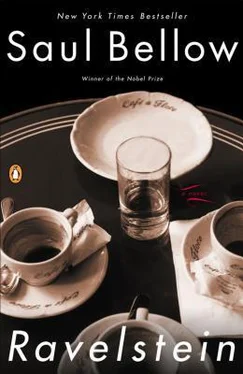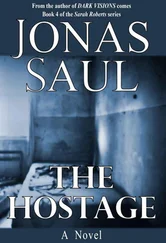At my age one has had a considerable experience of the ins and outs, the dodges that accompany self-interest. All such considerations are wildly mixed.
Dr. Bakst's cigua-toxin diagnosis had been challenged by other doctors. So he had an additional interest in proving himself right. He sent me to every corner of the hospital for CAT SCANs, MRIs and dozens of other esoteric examinations, in which the forces of the entire planet are upon you. I was able, but only up to a point, to separate his professional concerns from his other motives. The fact was that he knew I needed his "personal" visits, his daily presence-that I depended upon him.
It occurred to me during one fragmented and hopeless day that I might be one of those cunning patients whose master plan is to drink up the doctor's attention. The sick man sees that the physician must portion it out, and he also recognizes a special need to get ahead of his sick and dying rivals. The doctor naturally has to protect himself against these monopolizing impulses-perhaps should say instincts-of people who are blindly recovery-bent, who have the deep and special greed of the sick when they have decided not to die.
Dr. Bakst was solidly built but with an odd tendency about the head, which he carried like a boxer. It was of course out of the question to guess what he was thinking. He came and went as he saw fit. His glasses might turn toward you when his eyes did not. This led me to realize that it would be a mistake to try to communicate the many odd things I was experiencing. The problems he was setting me in arithmetic were much like the challenges thrown at David Copperfield by his wicked, tyrannical stepfather-"Nine dozen cheeses at two pounds, eight shillings, four pence. This reckoning should take you no more than three minutes." I had been good at sums in my schooldays, and it carried me back to childhood to work at them. For my fingers, too, they were good therapy, and I was soon able to sign checks and pay my bills.
The doctor now adopted a rougher style with me.
"What day of the week is it?"
"Tuesday."
"It's not Tuesday. Every adult knows what day it is."
"It must be Wednesday, then."
"Yes. And what's the date?"
"I have no idea."
"Well, you're preparing to make a stab at it-a gamble. But from now on you're going to know the date like any normal person. You'll check it out every morning, and you'll be ready from now on to tell the day of the week and the exact calendar date." Then he pinned a calendar on the wall for me. The doctor had seen that my days were a morass of self-neglect and that I was demoralized, drifting and losing heart through slackness and disorder.
It is possible that Dr. Bakst saved me. I believe I owe my life to him and of course to Rosamund. Bakst didn't think that it had been a mistake to put me "on the floor' or that I was bound for a chronic care facility. He believed that I could-and therefore should-make the grade. Somehow he sized me up as capable of coming back. I wonder what medical practice would be if doctors were to dismiss such intuitions. Dr. Bakst, like a skillful Indian scout of the last century, pressed his ear to the rail and heard the locomotive coming. Life would soon be back, and I would occupy my seat in the life-train. Death would shrink into its former place at the margin of the landscape. The patients desire is to crawl or limp or maneuver himself back to the life that preceded the illness, and to entrench and fortify himself in the old position.
If I had died I would naturally have been released from the promise I had made years ago to write a short description of Ravel-stein and to give an account of his life. Having come near death myself, I don't need to fear the guilt the living often feel about those others-parents, wives, husbands, brothers, and friends-in their graves.
Just out of college in the late thirties I was a research assistant helping to compile a geographical guide, and I learned that there was an Athens in almost every state of the union. It was also a fact that A. N. Whitehead had prophesied during a sojourn in Chicago that it was destined to lead the modern world. Intelligence was here for everybody's free use, and so it was highly possible that this city might serve to be a new Athens.
When I told this to Ravelstein I remember that he laughed exorbitantly and said, "If this happens here it won't be because of Whitehead. There wasn't enough philosophy in him to fill a birth day balloon. Not that Russell was much better."
I was interested in such opinions not because I had philosophical ambitions but because without much knowledge of political philosophy, I was preparing to write, had agreed to write, a memoir of Ravelstein, a political philosopher. And I couldn't say whether Whitehead and Russell had or had not developed ideas worth examining. Ravelstein sharply told me not to bother my mind with their studies, essays, and opinions. But I had already read five or six of their books. We should be grateful for good advice in these matters since life is too short to risk a waste of time-an entire month, say, on Russell's _History of Philosophy__, an obviously deformed and even cranky book, very modern in that it tries to spare you the study of several German and French philosophers.
In his own way Ravelstein tried to protect me from poring over the works of the thinkers he most admired. He ordered me to write this memoir, yes, but he didn't think it was necessary for me to grind away at the classics of Western thought. But for the purposes of a short biography I understood him well enough, and I agreed that it should be done by someone like me. Furthermore, I am a great believer in the power of unfinished work to keep you alive. But your survival can't be explained by this simple one-to-one abstract equivalence. Rosamund kept me from dying. I can't represent this without taking it on frontally and I can't take it on frontally while my interests remain centered on Ravelstein. Rosamund had studied love-Rousseauan romantic love and the Platonic Eros as well, with Ravelstein-but she knew far more about it than either her teacher or her husband.
But I would rather see Ravelstein again than to explain matters it doesn't help to explain.
Ravelstein, dressing to go out, is talking to me, and I go back and forth with him while trying to hear what he is saying. The music is pouring from his hi-fi-the many planes of his bare, bald head go before me in the corridor between his living room and his monumental master bedroom. He stops before his pier-glass-no wall mirrors here-and puts in the heavy gold cufflinks, buttons up the Jermyn Street Kisser Asser striped shirt-American Trustworthy laundry-and-cleaners deliver his shirts puffed out with tissue paper. He winds up his tie lifting the collar that crackles with starch. He makes a luxurious knot. The unsteady fingers, long, ill-coordinated, nervous to the point of decadence, make a double lap. Ravel-stein likes a big tie-knot-after all, he is a large man. Then he sits down on the beautifully cured fleeces of his bed and puts on the Poulsen and Skone tan Wellington boots. His left foot is several sizes smaller than the right but there is no limp. He smokes, of course, he is always smoking, and tilts the head away from the smoke while he knots and pulls the knot into place. The cast and orchestra are pouring out the _Italian Maiden in Algiers__. This is dressing music, accessory or mood music, but Ravelstein takes a Nietzschean view, favorable to comedy and bandstands. Better Bizet and _Carmen__ than Wagner and the _Ring__. He likes the volume of his powerful set turned up to the maximum. The ringing phone is left to the answering machine. He puts on his $5,000 suit, an Italian wool mixed with silk. He pulls down the coat cuff with his fingertips and polishes the top of his head. And perhaps he relishes having so many instruments serenading him, so many musicians in attendance. He corresponds with compact disc companies behind the Iron Curtain. He has helpers going to the post office to pay customs duties for him.
Читать дальше












